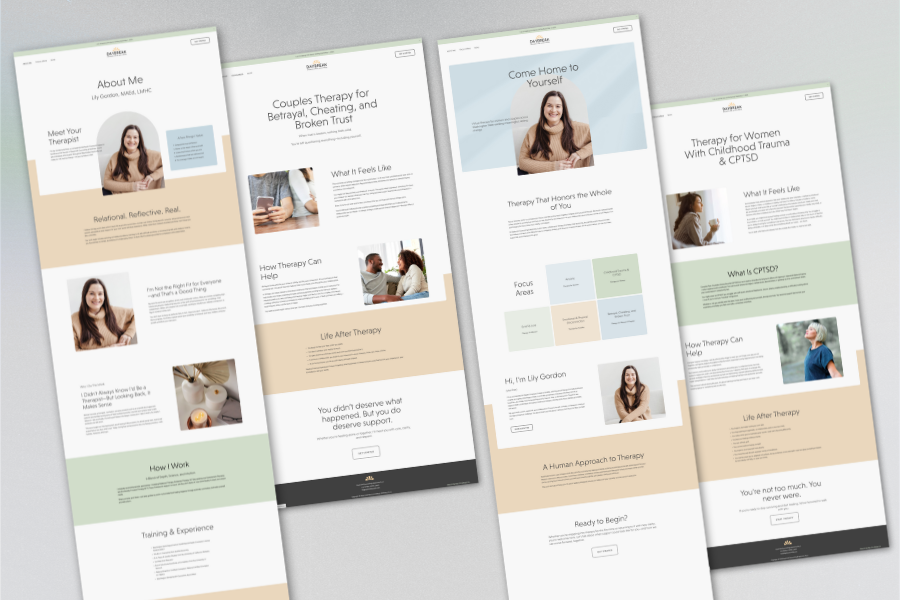How to Know Your Niche Fits You (Without Overthinking It)
Summary: This article explores how therapists can choose a niche with confidence by tuning into internal alignment rather than relying solely on traditional business metrics. Instead of forcing a niche based on market demand or external pressure, therapists are encouraged to notice their curiosity, pay attention to their nervous system, and reflect on the values and lived experiences that make certain client work feel meaningful. The piece walks through ten grounding questions and self-reflection practices that help clinicians identify a niche that feels energizing, sustainable, and aligned with who they are becoming. The core message: you do not need absolute certainty to choose a niche. You need a steady yes, room to evolve, and trust in your own professional intuition.
This article is part one of a three-part series on niching for therapists.
In this first piece, we are exploring how to choose a niche that genuinely fits you. Part two will help you write website copy that speaks directly to your niche, and part three will walk you through how to stand out as an expert in your specialty.
How to Know Your Niche Fits You (Without Overthinking It)
Choosing a niche can feel energizing at first. You get inspired, you get clarity, and you feel ready to move forward.
And then, suddenly, doubts sneak in.
What if I get bored.
What if choosing a niche limits me.
What if I pick wrong.
What if I commit to something and regret it.
If you are a therapist who values depth, integrity, and doing work that feels genuinely aligned, this is not just a marketing decision. It is about identity, meaning, and connection to the work. There is a reason it feels tender.
Some business coaches tell therapists to simply test a niche and watch the data. That works beautifully for a small percentage of therapists. But most therapists do not choose their work based on metrics alone. They choose from the inside out. From personal story, curiosity, values, and lived experience. From who they want to become as a clinician and who they want to sit with in the room.
Your internal experience matters here. And it can guide you.
The goal is not perfect certainty. The goal is a grounded, honest yes that feels meaningful enough to build on and flexible enough to evolve.
Below are ten ways to assess whether a niche fits you, not through fear or pressure, but through clarity, curiosity, and self-trust.
1. Notice Your Curiosity, Not Just Your Competence
Competence is the baseline. Curiosity is what keeps your clinical work alive over time.
Ask yourself:
When I think about this niche, do I feel genuinely interested.
Would I want to learn more about this area purely because it is compelling.
Can I imagine myself still feeling drawn to these clients or themes a year from now.
Curiosity is a long-term fuel source. It keeps the work fresh. If you feel intellectually or emotionally pulled toward a topic, even in a quiet way, that is meaningful. Curiosity often takes the shape of steady intrigue, not fireworks. Notice where your attention naturally goes.
2. Pay Attention to Your Nervous System
Your body is a wise part of this decision. When you picture stepping into a niche, notice what happens internally.
Do you feel settled.
Open.
Grounded.
Or do you feel constricted.
Tense.
Like you are performing a version of yourself instead of being yourself.
This does not need to be a dramatic full-body yes. It can simply feel like spaciousness. A little more breath. A sense that you could move in this direction without forcing it.
Your niche should feel like your system can hold it.
3. Connect the Niche to Something That Matters to You
A niche is not only who you work with. It is also why the work matters to you.
Consider:
Does this niche intersect with values that guide your life or your work.
Does it connect to experiences or insights that shaped you.
Does it feel purposeful to help people with these themes or struggles.
You do not need to have lived the exact story your clients have lived. What matters is that the topic feels meaningful enough to sit with week after week. Purpose produces longevity.
4. Track the Sessions That Energize You
Think about your best work days. The sessions you leave feeling grounded, grateful, or intellectually engaged.
Ask yourself:
Which types of clients do I feel most present with.
Who do I find myself thinking about between sessions because I truly care.
Which session themes leave me feeling fulfilled instead of depleted.
Even if you cannot clearly name a niche yet, there are clues in the sessions that light you up. Let your own experience guide you.
5. Notice What You Naturally Gravitate Toward
Your interests have already been revealing your niche. You simply may not have framed it that way yet.
Consider:
The trainings you sign up for without hesitation
The books or podcasts you gravitate toward
Clinical conversations that energize you
Topics you instinctively want to understand more deeply
Your professional curiosity is not random. It points somewhere. Let it inform your decision rather than ignoring it in favor of a niche you think you are supposed to choose.
6. Imagine Yourself Known for This Work
Picture yourself a year from now.
You have been writing about this topic, speaking about it, and showing up confidently in that space. You are known for it.
How does that feel?
Do you feel satisfied?
Proud?
Grounded in an identity that aligns with your values?
Or does it feel like a persona? Like you are stepping into something that does not belong to you.
Visualizing yourself in a future version of the niche can reveal whether you are choosing from inner alignment or external pressure.
7. Think About Range, Not Restriction
A niche does not reduce your work. It deepens it.
People often imagine a niche as a tiny box: seeing the same symptoms in the same people over and over. But real clinical niches are complex. They invite nuance. They expand into related layers and subtopics.
For example, identity work touches boundaries, relationship patterns, trauma, grief, embodiment, family dynamics. Chronic illness work touches identity shifts, grief, meaning, self-worth, rest, pacing, and internalized ableism.
A niche opens a door into a rich ecosystem of human experience. You are not narrowing your humanity as a clinician. You are choosing a focal point that allows you to go deeper.
8. Name the Fear and Separate It from Truth
Most hesitation around niching is not about boredom. It is about fear.
For example:
Fear of being too visible
Fear of disappointing people who do not fit the niche
Fear of choosing wrong and looking back with regret
Fear of identity commitment
Fear that success will require more vulnerability than feels comfortable
When you name the fear, you can see it. And once you can see it, you can choose your niche from clarity rather than self-protection.
9. Give Yourself Permission to Evolve
You are not signing a lifetime contract. You are choosing a starting point.
You are allowed to refine.
You are allowed to change direction.
You are allowed to evolve your messaging as you and your clients evolve.
You are allowed to grow into niche authority gradually and organically.
Commitment builds authority, but flexibility protects authenticity. Let this be a grounded choice, not a permanent identity label.
10. Ask One Final Question
Do I feel a steady yes?
Not perfection.
Not certainty.
Just a quiet, grounded yes that feels real.
That is enough to begin.
Final Thoughts
You do not need to feel one hundred percent sure before you choose a niche. You only need enough clarity to trust yourself and begin walking in that direction. You will learn by doing. You will refine by showing up. You will deepen your specialty through experience and voice.
Most therapists who niche down do not feel limited. They feel more like themselves. The work becomes richer, not narrower. Their confidence grows. Their voice strengthens. Their ideal clients find them with ease.
Choosing a niche is not about trapping yourself. It is about choosing where your work can flourish.
And if it does not end up being the right fit, you will know. You will shift in a thoughtful way. You will not lose your momentum. Clinicians evolve. Your niche can too.
Trust your instincts. Trust what pulls you. Trust the work.
And then give it room to grow.
Next in this series: After You Choose your Niche: Mastering Your Message. How to write niche-aligned website copy that feels human, warm, and grounded in your real clinical voice.
Want to go deeper into niching? Explore more articles in the Niching Series and library:
Pin it!
Some of My Favorite Private Practice Tools
Resources and Referral Links

































